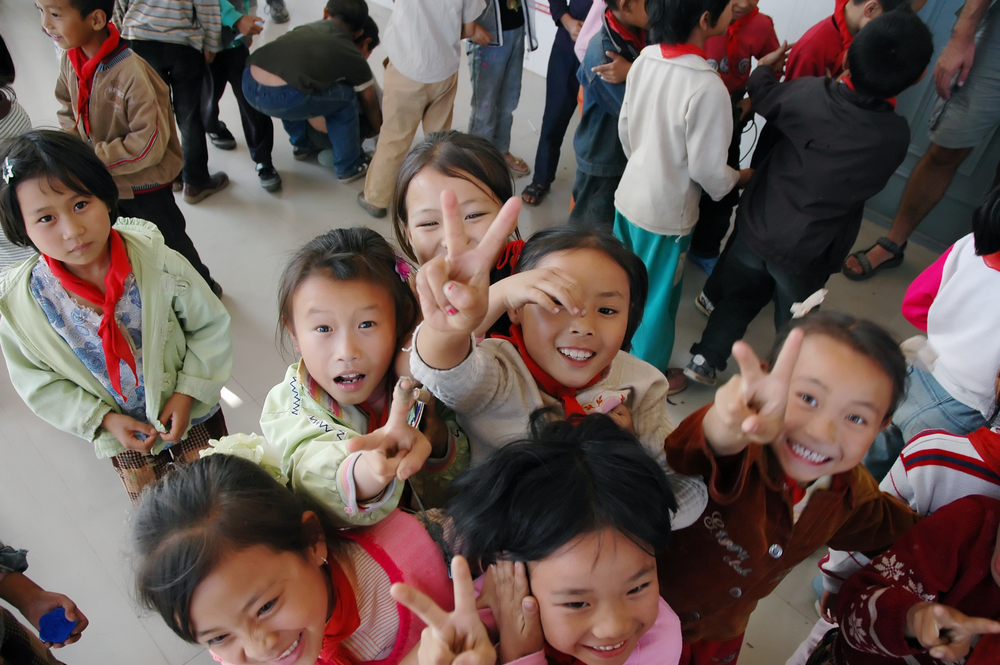China's One-Child Policy Creates 'Little Emperors'

Children born under China's one-child policy, which limits most urban families to a single child, are less trusting, more risk-averse and more pessimistic than children born before the policy went into action, a new study finds.
The research in some ways confirms stereotypes in the Chinese media about "Little Emperor Syndrome," which is the idea that a generation of only children in the country is growing up coddled and unsocialized. The seeming personality changes could have real-world impacts, the researchers say, creating a relatively risk-averse generation that may hinder innovation.
However, the size of the study may limit its findings, an outside researcher warned.
Growing up singleton
Facing rapid population growth, China implemented the one-child policy beginning in 1979. Though exceptions are made for rural or ethnic minority families and for twin births or families in which the first child is seriously disabled, a typical urban Chinese family is limited to a single child and faces steep fines for having another. [Crowded Planet: 7 (Billion) Population Milestones]
The policy has led to concern in China about the effects of so many children growing up as an only child, said Lisa Cameron, an economist at Monash University in Australia, but the evidence for any change was lacking.
"While everybody was talking about it, nobody had really looked at it really closely," Cameron told LiveScience. "We thought it was a great opportunity."
Get the world’s most fascinating discoveries delivered straight to your inbox.
Cameron and her colleagues used economic games that have been shown to match up with people's real-life behaviors to measure altruism, trust, trustworthiness, competitiveness and attitudes toward risk in people born before and after the policy went into effect.
The researchers recruited 421 people from Beijing born either in 1975 or 1978 before the one-child policy, or in 1980 or 1983 after the policy. A survey company used multiple methods, from website postings to notices on street corners, to recruit as random a sample as possible.
The researchers kept such a narrow age spread between the two groups to prevent other generational changes from skewing the results. All of the participants had to have parents registered with China's hukou system, the domestic registry through which the one-child policy is enforced. Both the pre- and post-policy groups had equal numbers of men and women.
The participants were representative of Beijing's general population, the researchers found, albeit slightly better educated. Of those born before the one-child policy, 27 percent were only children compared with 91 percent of those born after.
Measuring change
Participants played a variety of economic games designed to get at aspects of their behavior and personality. For example, to test willingness to take risks, participants were given 100 yuan (about $16) and told they could invest it with a 50-50 chance of tripling their money and a 50-50 chance of getting nothing back. Risk-averse types would choose the safe bet and keep their 100 yuan, while risk takers would go for the chance to make 300 yuan.
In another game, this one to measure competitiveness, participants had to add up a series of two-digit numbers. They were told that they could earn a set sum of money for each series they added correctly in a particular time. Alternatively, they could be paired with another participant for the chance to win extra if they beat out that person in problems completed correctly. The more competitive types would jump at the chance to go head-to-head with another person.
After the games, the participants filled out questionnaires to measure aspects of personality and life outlook.
Less trusting, more pessimistic
The results revealed that people born under the one-child policy were less trusting and less trustworthy (they cheated) in games designed to show faith in others. Post one-child policy age groups were also more risk-averse and less competitive. About 58 percent of the one-child policy group chose to risk their 100 yuan, for example, compared with 66.4 percent of the pre-policy group.
Likewise, only 44.2 percent of the post-one-child-policy group chose to compete with others in the sum game, an option taken by 51.8 percent of people born before the policy.
Altruism was not significantly different between groups, the researchers found. However, those born after 1979 were more pessimistic than those born before. They were also less conscientious and more neurotic, a personality trait encompassing anxiety. The results held when controlling for education, gender, maternal education and participants' city of birth (Beijing or another city). [Neurotic? 7 Personality Traits That Are Bad For You]
Confirming stereotypes?
The findings match many of the stereotypes about "Little Emperors" in the media, Cameron said. For example, parents of only children in China may indulge those kids, making them less willing to take risks or compete, she said. Lack of trust and trustworthiness may reflect poorer social skills of those who didn't grow up sharing and negotiating with siblings. [10 Scientific Tips For Raising Happy Kids]
"Largely it mapped into what we expected, although we were surprised by the magnitude and the strength," Cameron said.
The gap between the pre- and post-policy groups is large enough that researchers would expect it to have real-world effects, she said. For example, the one-child policy could hamper entrepreneurship by producing a relatively risk-averse generation.
The findings are also likely a direct result of the policy rather than other generational shifts, Cameron said, because repeating the analyses with only the 1978 and 1980 groups, only two years apart, does not change the results.
In the time span of the study, generational shifts probably aren't enough to explain the results, agreed Jean Twenge, a San Diego State University psychology professor and author of "Generation Me: Why Today's Young Americans Are More Confident, Assertive, Entitled — and More Miserable Than Ever Before" (Free Press, 2007).
Twenge was not involved in the study, but she has conducted extensive cross-generational research in American populations. She praised the study's methods but warned that 421 is a small sample size for research of this magnitude.
"What you'd need, preferably, is for it to be replicated in an even better and larger sample," Twenge told LiveScience.
Cameron and her colleagues report their findings online today (Jan. 10) in the journal Science.
Follow Stephanie Pappas on Twitter @sipappas or LiveScience @livescience. We're also on Facebook & Google+.

Stephanie Pappas is a contributing writer for Live Science, covering topics ranging from geoscience to archaeology to the human brain and behavior. She was previously a senior writer for Live Science but is now a freelancer based in Denver, Colorado, and regularly contributes to Scientific American and The Monitor, the monthly magazine of the American Psychological Association. Stephanie received a bachelor's degree in psychology from the University of South Carolina and a graduate certificate in science communication from the University of California, Santa Cruz.


